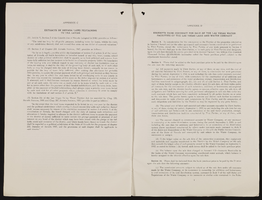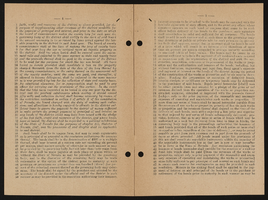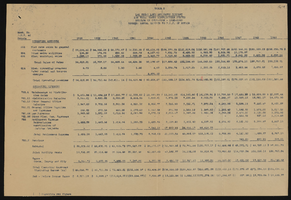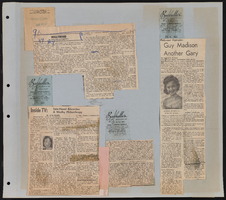Search the Special Collections and Archives Portal
Search Results
Basic Magnesium, Inc. (BMI) Records and Photographs
Identifier
Abstract
The Basic Magnesium Inc. (BMI) Records and Photographs (1933-1965) document the planning, construction, and management of the BMI magnesium manufacturing plants near present-day Henderson in Clark County, Nevada and a magnesium mining operation in Gabbs, Nye County, Nevada. Materials include chronological reports, press releases, telegrams, budgets, building diagrams, maps, and black-and-white photographic prints. The records document employee housing and infrastructure projects, magnesium production statistics, and employee data. The photographic prints, which include many aerial images, provide a visual record of the construction of the plant, the mining operation, and the associated support facilities and employee housing.
Archival Collection
Crockett Family Photographs
Identifier
Abstract
The Crockett Family Photographs (approximately 1940-2008) are comprised of aerial photographs of Alamo Airport (later Harry Reid International Airport) and the surrounding Las Vegas Valley in the 1940s and 1950s. Photographs of the interior, exterior, and airfield at Alamo Airport document the early stages of what is now one of the busiest international airports in the United States. The collection also contains audiovisual material, which depict events including the Miss Rodeo America pageant and the Sahara Cup boat races on Lake Mead, and locations including Fremont Street in downtown Las Vegas, Nevada and Hoover Dam. A significant portion of the collection consists of photographs of the Crockett family at various events, on family vacations, and their home in Las Vegas, Nevada.
Archival Collection

Emilia Marquez oral history interview: transcript
Date
Archival Collection
Description
Oral history interview with Emilia Marquez conducted by Maribel Estrada Calderón on July 5, 2019 for the Latinx Voices of Southern Nevada Oral History Project. Claytee D. White and Emily Lucile are also present during the interview. Emilia Marquez was born in the United Stated and raised in Alexandria, Virginia, where her father worked as a bricklayer, until the age of twelve, when her father decided to move the family back to Uruguay. She describes acclimating to her new life in middle school and her shift from being perceived as an outsider in Uruguay to accepting Uruguay as home. She describes life in Uruguay and the positions that her family held while living there. After meeting and marrying her husband they trained to work in a casino. She trained as a slot machine operator, and her husband trained as a dealer. This eventually led them to leave Uruguay for the U.S. After the encouragement of her father and mother, she moved with her mother to Las Vegas to work in the casino industry. She describes working as a change person at the Luxor before moving to the newly opened Palms, where she worked until she left it to work at the Wynn. She ends the interview talking about various Uruguayan dishes and traditions, and a brief history of Uruguay. Subjects discussed in this interview: Uruguay, immigration, Las Vegas Strip, Latinx, Luxor.
Text
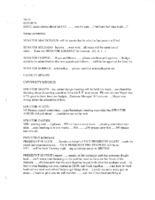
Meeting minutes for Consolidated Student Senate, University of Nevada, Las Vegas, May 03, 2004
Date
Archival Collection
Description
Text

